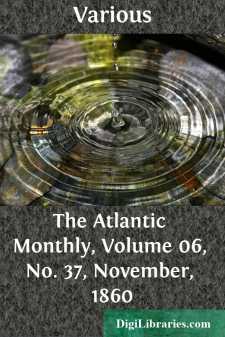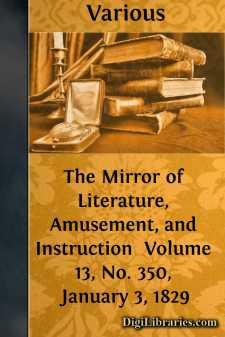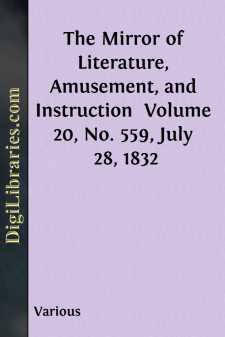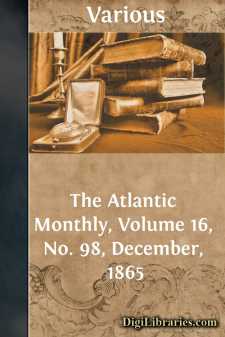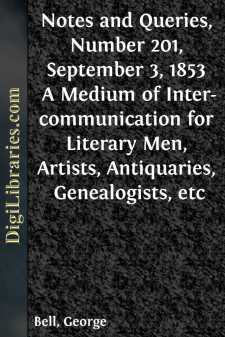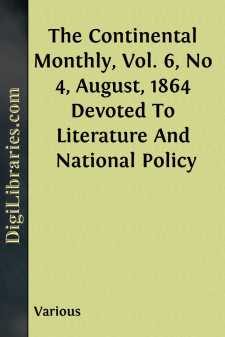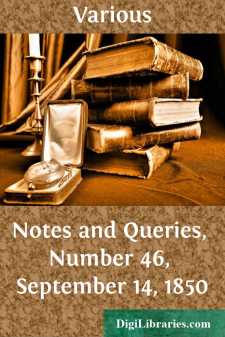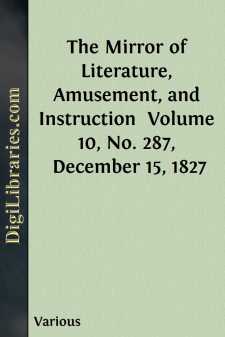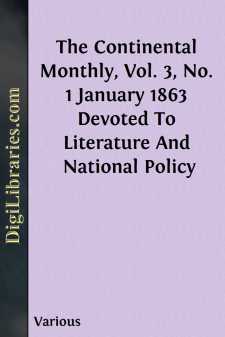Periodicals
- Art 27
- Children's periodicals 59
- Entertainment 5
- Food/Wine 2
- Games/Humor 455
- General
- Health 1
- History 53
- House/Home 1
- Regional 62
- Science/Nature 118
- Transportation 10
General Books
Sort by:
by:
Various
THOMAS HOOD. Thomas Hood was originally intended for business, and entered a mercantile house; but the failure of his health, at fifteen years of age, compelled him to leave it, and go to Scotland, where he remained two years, with much gain to his body and his mind. On his return to London, he applied himself to learn the art of engraving; but his constitution would not allow him to pursue it. Yet...
more...
by:
Various
No description available
by:
Various
OPORTO.OPORTO.Persons who are looking for "news from the seat of war" will probably hail the timely appearance of this Engraving, and regard it as folks sitting at a play do a drop-scene between the acts. The reader knows our pacific politics: we are of the pen, not of the sword; but we cannot be indifferent to a great political result, when Old men, and beldams, in the streets Do prophesy upon...
more...
by:
Various
CHAPTER I "Then I say, once for all, that priest shall never darken my doors again." "Then I say they are my doors, and not yours, and that holy man shall brighten them whenever he will." The gentleman and lady, who faced each other pale and furious, and interchanged this bitter defiance, were man and wife, and had loved each other well. Miss Catharine Peyton was a young lady of ancient...
more...
by:
George Bell
"THAT SWINNEY." Junius thus wrote to H. S. Woodfall in a private note, to which Dr. Good has affixed the date July 21st, 1769 (vol. i. p. 174.*) "That Swinney is a wretched but dangerous fool. He had the impudence to go to Lord G. Sackville, whom he had never spoken to, and to ask him whether or no he was the author of Junius: take care of him." This paragraph has given rise to a great...
more...
by:
Various
SOME USES OF A CIVIL WAR. War is a great evil. We may confess that, at the start. The Peace Society has the argument its own way. The bloody field, the mangled dying, hoof-trampled into the reeking sod, the groans, and cries, and curses, the wrath, and hate, and madness, the horror and the hell of a great battle, are things no rhetoric can ever make lovely. The poet may weave his wreath of victory for...
more...
by:
William Curtis
[73] Monsonia speciosa. Large-flower'd Monsonia. Class and Order. Polyadelphia Dodecandria. Generic Character. Cal. 5-phyllus. Cor. 5-petala. Stam. 15. connata in 5 filamenta. Stylus 5-fidus. Caps. 5-cocca. Specific Character and Synonyms. MONSONIA speciosa foliis quinatis: foliolis bipinnatis, Lin. Syst. Vegetab. p. 697. MONSONIA grandiflora. Burm. prodr. 23. N73The genus of which this charming...
more...
by:
Various
NOTES. THE MEANING OF "DRINK UP EISELL" IN HAMLET. Few passages have been more discussed than this wild challenge of Hamlet to Laertes at the grave of Ophelia: "Ham. I lov'd Ophelia! forty thousand brothers Could not, with all their quantity of love, Make up my sum. What wilt thou do for her? —Zounds! show me what thou'lt do? Woo't weep? Woo't fight? Woo't fast?...
more...
by:
Various
HISTORICAL FACTS RELATIVE TO THE EARLY CONDITION OF THE ENGLISH.(For the Mirror.)London, in early times (King Ethelred's reign) consisted only of scattered buildings from Ludgate to Westminster, and none where the heart of the city now is; it was afterwards extended more westward and continued increasing—-eastward being neglected until a more later period. Who can view its present well...
more...
by:
Various
THE HUGUENOTS OF NEW ROCHELLE. It is worthy of record that Westchester County, New York, was settled by emigrants from New England and France, and both seeking homes from religious persecutions. As early as 1642, John Throcmorton, with thirty-five associates, made the first settlement in this section, with the approbation of the Dutch authorities. With Roger Williams, driven away from New England by...
more...


